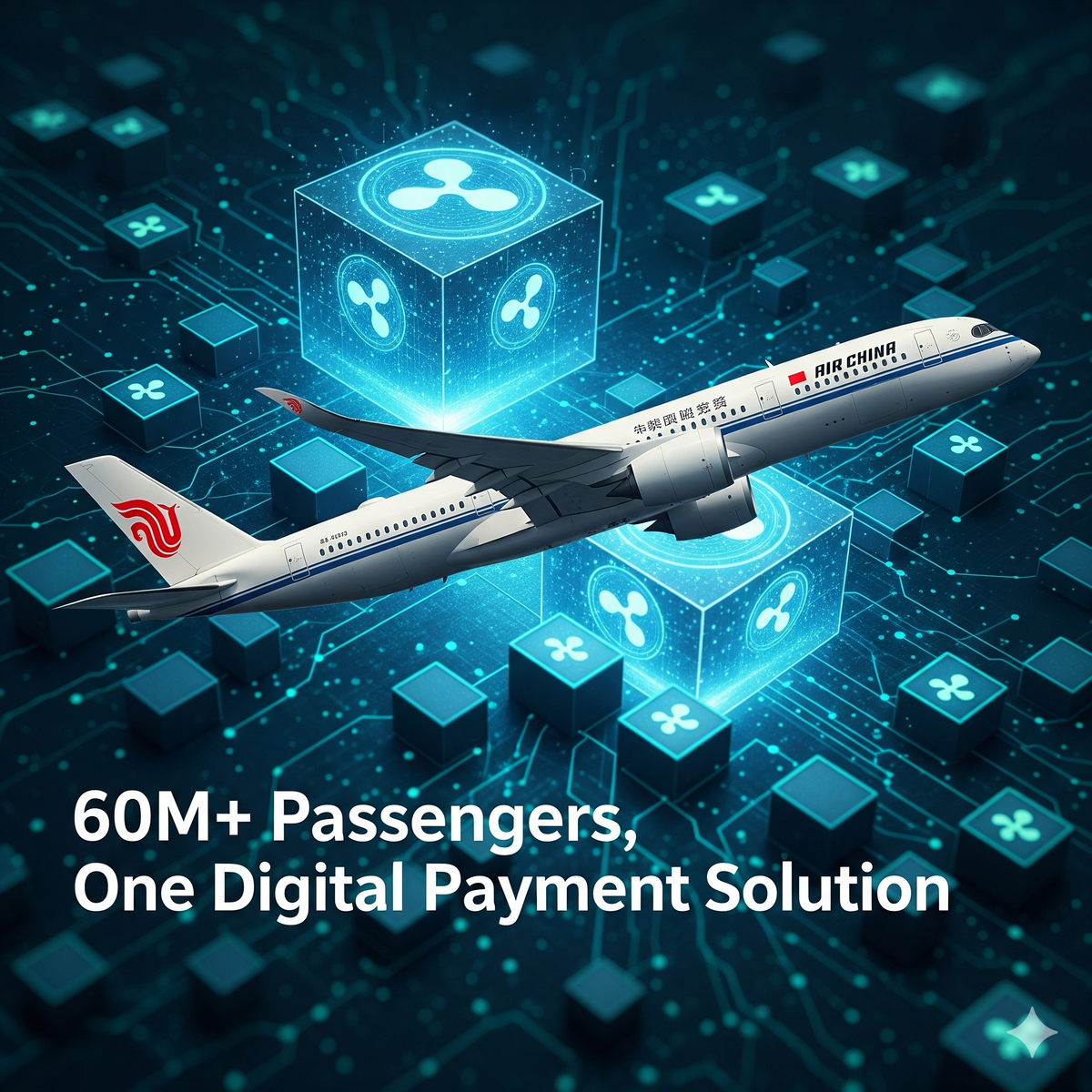Air China Partners with Webus for XRP Payments
Air China partners with Webus to bring XRP payments to 60+ million PhoenixMiles members, marking the largest commercial crypto deployment in aviation. This groundbreaking collaboration could revolutionize travel payments globally.

BOTTOM LINE: Air China's partnership with Webus International to integrate XRP payments for 60+ million PhoenixMiles members represents the largest commercial deployment of Ripple's technology in the travel sector, potentially transforming how millions of travelers make cross-border payments.
Nasdaq-listed Webus International Limited has announced a groundbreaking strategic partnership with Air China, one of China's three major state-owned airlines, that could revolutionize cryptocurrency adoption in the travel industry. The collaboration will provide over 60 million PhoenixMiles loyalty members with access to XRP-powered payment solutions through Webus's Wetour platform, marking the largest commercial integration of Ripple's technology in aviation history.
Partnership Details and Scope
The strategic alliance enables Webus's travel service brand, Wetour, to offer premium chauffeur services and airport transfers to Air China's passengers and PhoenixMiles members worldwide. Looking ahead, Wetour plans to provide Air China's PhoenixMiles members with access to its overseas platform with XRP payment support, enabling travelers to benefit from faster settlement, tokenized rewards, and blockchain-enabled vouchers directly tied to their membership benefits, subject to future business development and regulatory compliance.
Webus CEO Nan Zheng emphasized the significance of this development, stating that "This collaboration with Air China, with the potential to reach more than 60 million members and passengers, not only expands Wetour's global service footprint but also accelerates our vision of building a Ripple-integrated travel ecosystem."
The partnership builds on Webus's aggressive XRP treasury strategy, which includes securing up to $100 million in funding through a senior equity line of credit specifically to support XRP integration. Earlier this year, the company announced plans for up to $300 million in strategic financing to establish XRP reserves for global payment solutions.
Market Context and Regulatory Framework
The announcement comes at a pivotal moment for XRP adoption in Asia, where blockchain-based payments are gaining significant traction. Webus highlighted that the implementation of XRP-based solutions will be conducted in close coordination with regional regulators and financial institutions to ensure compliance with digital asset frameworks.
Currently trading at approximately $2.82, XRP has demonstrated strong performance with a 35.79% gain over the past 90 days, despite recent volatility. The token's technical capabilities make it particularly well-suited for travel applications, processing up to 1,500 transactions per second with settlement times of just 3-5 seconds.
Broader Industry Implications
This partnership arrives as SWIFT, the global messaging system handling $150 trillion in annual flows, has begun testing both XRP and Hedera's HBAR for cross-border payments. SWIFT has started testing Ripple's XRP Ledger and Hedera's Hashgraph (HBAR) to streamline cross-border transactions. The tests are meant to make blockchain technology work with existing financial systems by adopting ISO 20022 standards.
Industry experts note that previous attempts by airlines like AirAsia and KLM to integrate cryptocurrency payments offer valuable lessons about implementation challenges and customer adoption strategies. The Webus-Air China partnership appears designed to address these concerns through careful regulatory compliance and gradual rollout.
XRP/Ripple Analysis: Game-Changing Potential
XRP Price Implications
The partnership with Air China represents a significant real-world use case that could drive sustained XRP demand. With over 60 million potential users gaining access to XRP payments, this deployment could generate substantial transaction volume. Ripple CEO Brad Garlinghouse reportedly said Wednesday that the company's XRP cryptocurrency could account for 14% of the cross-border payment volume currently handled by SWIFT within five years.
Ripple's Business Operations Impact
For Ripple, the Air China partnership validates its enterprise strategy and demonstrates XRP's viability for large-scale commercial applications. The collaboration provides a template for similar partnerships with other airlines and travel companies, particularly in the Asia-Pacific region where Ripple has been actively building relationships.
Legal Standing Enhancement
Coming after favorable rulings in Ripple's SEC case, this partnership reinforces XRP's position as a legitimate payment rail rather than a security. The regulatory compliance emphasis throughout the announcement suggests careful legal vetting that could benefit future enterprise adoptions.
Partnership Expansion Opportunities
The partnership also includes plans to extend XRP-enabled services to duty-free stores, hotel chains, and transportation providers connected to the PhoenixMiles program. This ecosystem approach could create a comprehensive blockchain-powered travel infrastructure spanning multiple service providers.
Adoption Prospects
The partnership positions XRP at the forefront of travel industry digitization. The crypto community is buzzing with excitement about this latest partnership, eagerly anticipating a surge in transaction volumes that could emerge from merging XRP with the travel sector. Success here could accelerate adoption across other major airlines and travel platforms globally.
Challenges and Considerations
Despite the promising developments, several factors could impact implementation success. Regulatory compliance remains paramount, with both companies emphasizing that XRP integration depends on meeting all applicable requirements. Additionally, the travel industry's traditional payment infrastructure presents integration challenges that must be carefully managed.
Regulatory compliance is a massive hurdle for XRP's widespread use in travel. Governments are still figuring out how to regulate cryptocurrencies, and companies like Webus and Air China have to navigate a minefield of legal requirements.
KEY TAKEAWAYS: The Webus-Air China partnership represents a watershed moment for cryptocurrency adoption in mainstream travel, providing XRP with its largest commercial deployment to date. Success could trigger similar partnerships across the global aviation industry, while regulatory compliance and technical execution remain critical factors to monitor.
SOURCES:
- Globe Newswire - Webus International Press Release (September 3, 2025)
- Crypto Briefing - "Nasdaq-listed Webus plans to bring XRP payments to Air China loyalty members"
- BanklessTimes - "Webus Taps Air China's 60M Flyers to Pioneer XRP Payments in Travel"
- AInvest - "XRP News Today: Air China and Webus Forge Blockchain-Driven Travel Revolution"
- Cryptopolitan - "SWIFT is testing XRP and HBAR for blockchain-based cross-border payments"
- PYMNTS - "Ripple: XRP Could Account for 14% of Cross-Border Payments Volume"
DISCLAIMER: This newsletter is for informational purposes only and does not constitute investment advice, advertising, or a recommendation to buy, sell, or hold any securities. This content is not sponsored by or affiliated with Uphold, XRP, or any mentioned entities. Investments in cryptocurrencies or other financial assets carry significant risks, including the potential for total loss, extreme volatility, and regulatory uncertainty. Past performance is not indicative of future results. Always consult a qualified financial



